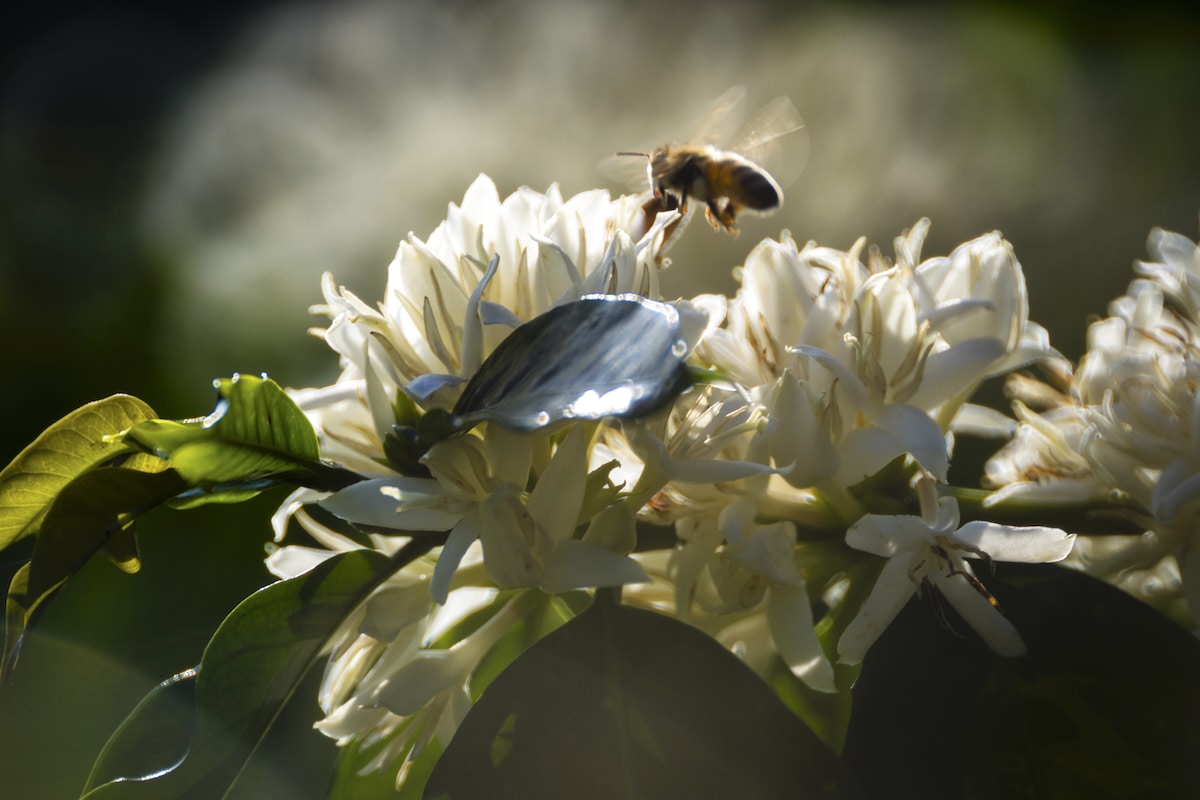Coffee and Cocoa Plants Especially at Risk From Pollinator Losses

 Why you can trust us
Why you can trust us
Founded in 2005 as an Ohio-based environmental newspaper, EcoWatch is a digital platform dedicated to publishing quality, science-based content on environmental issues, causes, and solutions.
The loss of pollinator insects is putting some of the most popular tropical crops in the world — like cocoa, coffee, mango and watermelon — at risk, a new study led by researchers from University College London (UCL) and the Natural History Museum has found.
The research team looked at how climate change and land use modification have led to serious effects for the pollination of crops worldwide, a press release from UCL said.
The scientists cataloged 3,080 species of insect pollinators and gathered data from 1,507 agricultural sites across the globe. Their findings revealed that climate change and agriculture have led to significant losses in the richness and abundance of pollinators.
The study, “Key tropical crops at risk from pollinator loss due to climate change and land use,” was published in the journal Science Advances.
“[I]t is expected that the tropics will experience the greatest risk to crop production from pollinator losses. Localized risk is highest and predicted to increase most rapidly, in regions of sub-Saharan Africa, northern South America, and Southeast Asia. Via pollinator loss alone, climate change and agricultural land use could be a risk to human well-being,” the study said.
Three quarters of the planet’s crops rely on animal pollination to some extent, the press release said. The researchers created a model to explore which of these crops were most at risk until 2050. They hope their findings will serve as a warming to agricultural and conservation communities.
“While localised risks are highest in regions like sub-Saharan Africa, northern South America, and south-east Asia, the implications of this extend globally via the trade in pollination dependent crops,” said lead author of the study Dr. Joe Millard, who completed the research as a Ph.D. student at the UCL Centre for Biodiversity & Environment Research, before joining London’s Natural History Museum, in the UCL press release.
The study identified the tropics and the crops grown there as being especially vulnerable to the relationship between land use and climate change. The reduction of these crops could lead to heightened income insecurity for millions of the region’s small-scale farmers.
“As insects decline, due to being unable to cope with the interacting effects of climate change and land use, so too will the crops that rely on them as pollinators,” Millard said. “In some cases, these crops could be pollinated by hand but this would require more labour and more cost.”
The cacao tree is particularly difficult to grow, as it produces short-lived flowers that are pollinated almost exclusively by a certain type of midge, reported the Natural History Museum. However, the damp, shady environments that are preferred by the midge are under threat due to more intense cocoa production and climate change.
“Cocoa is experiencing a perfect storm of threats that mean it is at high risk of pollinator losses,” Millard said, as the Natural History Museum reported.
Planting patches of natural pollinator habitat between and around cropland is one way to provide a refuge of suitable microclimates for the insects.
“There are also other solutions that can help,” Millard said, according to the Natural History Museum. “It may be possible to breed varieties of these plants that can reproduce without pollinators, as has already been seen in some crops. Other technological solutions, like pollination by hand or through artificial means, are already used on a large scale for some crops like vanilla. To buffer against pollinator declines, it might become more common in crops like cocoa, but this will increase the production cost.”
The study highlights the importance of a diversity and abundance of pollinators for food security.
“Climate change poses grave threats not only to the natural environment and biodiversity, but also to human well-being, as the loss of pollinators can threaten the livelihoods of people across the globe who depend on crops that depend on animal pollination,” said senior author Dr. Tim Newbold of the UCL Centre for Biodiversity & Environment Research, UCL Biosciences, in the press release.
The best way to address the issue of pollinator losses is to restore and preserve their habitats while reducing greenhouse gas emissions in order to limit the most extreme climate change effects.
“Our findings underscore the urgent need to take global action to mitigate climate change, alongside efforts to slow down land use changes and protect natural habitats to avoid harming insect pollinators,” Newbold said.
Subscribe to get exclusive updates in our daily newsletter!
By signing up, you agree to the Terms of Use and Privacy Policy & to receive electronic communications from EcoWatch Media Group, which may include marketing promotions, advertisements and sponsored content.

 233k
233k  41k
41k  Subscribe
Subscribe 




